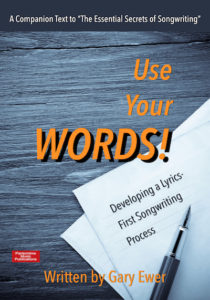For musicology students who delve mainly in the world of Classical music, history has a way of filtering out “bad” music, leaving them with what might otherwise be known as “the hits.” And there are lots of them to study.
Ask those same students to list every Classical composer they know, and they’ll be able to give you dozens of names. The best students might know of up to 40 or 50 composers . In reality, though, there have been many thousands of classical composers.
 Trying to get a handle on writing better lyrics? You need to place them front & centre in your songwriting process. “Use Your Words! Developing a Lyrics-First Songwriting Process” offers three different ways to start your songs with the lyrics. It’s FREE right now, with your purchase of “The Essential Secrets of Songwriting 10-eBook Bundle.”
Trying to get a handle on writing better lyrics? You need to place them front & centre in your songwriting process. “Use Your Words! Developing a Lyrics-First Songwriting Process” offers three different ways to start your songs with the lyrics. It’s FREE right now, with your purchase of “The Essential Secrets of Songwriting 10-eBook Bundle.”
We don’t know most of those composers at all. Some were acceptable composers, but their day job was probably doing something else, usually working as a teacher, church organist, or perhaps as a performer. Ever hear of Giuseppe Branzoli? Johann Tobias Krebs? George Pinto? Not likely. Their music was probably fine, but for a variety of reasons just didn’t rise to the level of consciousness required to make them household names today.
Filtering Out the Garbage
One way of thinking is that history does us a favour by filtering out garbage. After a few generations, maybe a hundred years or so, we’re left with a relatively small list of representative musical works that are considered true classics. So those musicology students I mentioned at the beginning of this post have it easy: the passage of time has revealed who the real musical geniuses are.
You can argue that only lazy students don’t go looking for the geniuses that have escaped our modern day collective consciousness. There are wonderful composers who have written lovely music, but for one reason or another have flown under the radar.
In the world of pop music, we don’t get a hundred years to filter out the garbage. The classical world’s one hundred years is more like 15 or 20 years in the pop world; pop styles and genres evolve at breakneck speed when compared to classical music. So how do you know which songs are good ones to study? Has enough time gone by to “filter out the garbage?”
The short, imperfect answer is: we learn which songs are good by initially trusting the hits. A song becomes a hit when enough people say that they like it. In days past, if enough people bought the song, and if enough people requested it to be played on the radio, that meant it was “good.” Nowadays, we work digital parameters into the mix, so we also consider how many times we view it online.
I say “initially trusting,” because, as with classical music, you’re missing out on a lot of good songs if you only trust what everyone else thinks is good. And given time, some of these “good”songs will reveal themselves to be weak or fad-ish, and will fade away as time filters them out. But how do you get to know other songs that you should be listening to?
Broadening Your Musical Landscape
The best way to expand on what you, as a student of songwriting, should be listening to is to find out what good songwriters and good performers have considered their favourite music. It’s very relevant to know.
This article from The New York Times, “Listen to Bob Dylan’s Many Influences,” for example, reveals the musicians from his past that made him the songwriter he became: Woody Guthrie, Odetta, Martin Carthy… some of these names will be known to you, others not. I found that article simply by entering “Bob Dylan influences” into Google. Try that with any of your favourite performers/songwriters.
The best songwriters are the ones who have learned to broaden their musical landscape. The best ones out there can list off previous songwriters — many of whom aren’t even working in the same genre — as crucial influences and inspirations. You need to broaden your musical landscape.
Who knows what the 23rd century world will consider the best songs from the early 21st century? We don’t yet have the benefit of that kind of time. For the time being, your best advancements as a songwriter will come from listening to as much music as you can, and then applying your understanding of the principles of good songwriting to decide for yourself what, in your opinion, is good.
Written by Gary Ewer. Follow Gary on Twitter.

“The Essential Secrets of Songwriting” eBook Bundle packages explore 11 principles of songwriting, and will take your own music to a new level of excellence. Right now, download a FREE COPY of “Use Your Words! Developing a Lyrics-First Songwriting Process”, when you get the 10-ebook Bundle.










